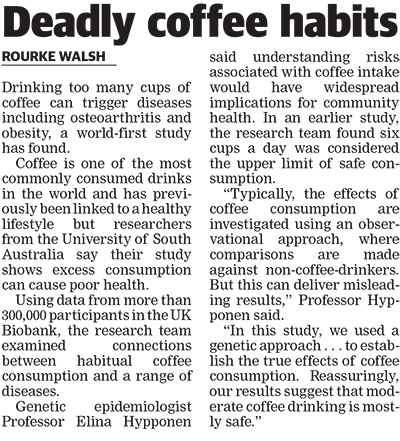Excess coffee consumption a culprit for poor health
By Annabel Mansfield
 SCIENCE
SCIENCEA world-first study from UniSA’s Australian Centre for Precision Health shows that excess coffee consumption can cause poor health.
 The West Australian 14 May 2020
The West Australian 14 May 2020Using data from more than 300,000 participants in the UK Biobank, researchers examined connections between genetically instrumented habitual coffee consumption and a full range of diseases, finding that too much coffee can increase the risk of osteoarthritis, arthropathy (joint disease) and obesity.
In earlier research conducted by UniSA Professor Elina Hyppönen and colleagues, six cups of coffee a day were considered the upper limit of safe consumption.
An expert genetic epidemiologist, Professor Hyppönen, says understanding any risks associated with habitual coffee intake could have very large implications for population health.
“Globally, we drink around three billion cups of coffee each day, so it makes sense to explore the pros and cons of this on our health,” Prof Hyppönen says.
“Typically, the effects of coffee consumption are investigated using an observational approach, where comparisons are made against non-coffee-drinkers. But this can deliver misleading results.
“In this study, we used a genetic approach – called MR-PheWAS analysis – to establish the true effects of coffee consumption against 1117 clinical conditions.
“Reassuringly, our results suggest that, moderate coffee drinking is mostly safe.
“But it also showed that habitual coffee consumption increased the risks of three diseases: osteoarthritis, arthropathy and obesity, which can cause significant pain and suffering for individuals with these conditions.”
Prof Hyppönen says the prevalence of these conditions in Australia and around the world shows how important it is to determine possible causes and influencers of the diseases.
“Excess coffee consumption can lead to increased risks of certain diseases,” she says.
“For people with a family history of osteoarthritis or arthritis, or for those who are worried about developing these conditions, these results should act as a cautionary message.
“The body generally sends powerful messages with respect to coffee consumption, so it’s imperative that individuals listen to these when consuming coffee.
“While these results are in many ways reassuring in terms of general coffee consumption, the message we should always remember is consume coffee in moderation – that’s the best bet to enjoy your coffee and good health too.”
Arthropathy, the most common form of which is arthritis, affects one in seven Australians and more than 54 million adults around the world.
Osteoarthritis (a chronic and progressive arthropathy that mostly affects the hands, spine and joints such as hips, knees and ankles) affects an estimated one in 11 Australians, and 300 million people worldwide.
Obesity is growing in prevalence worldwide, with nearly 40 per cent of adults over overweight and 13 per cent obese. In Australia, 67 per cent of Australian adults are overweight or obese.
Other Stories
- Excess coffee consumption a culprit for poor health
- We may well be able to eliminate coronavirus, but we’ll probably never eradicate it. Here’s the difference
- $10m fund helping students hardest hit by economic downturn
- Bittersweet celebration of nurses and midwives, 200 years after Florence Nightingale’s birth
- From the Vice Chancellor
- Achievements and Announcements
- Hawke’s legacy continues to grow as new materials added to archival collection
- Binge drinkers beware, Drunkorexia is calling
- Team effort creates ‘red dirt’ Anangu education space in the Adelaide Hills
- ‘Like looking for a needle in a haystack’: UniSA joins global hunt to find key molecule to block COVID-19
- Video: Hop aboard UniSA’s 737 flight simulator
- Simple teaching simulations prove big asset for UniSA and beyond
- Adjunct Professor John Wardle receives highest national architecture accolade
- The latest book from UniSA researchers
- In Pictures: Teal raises awareness for ovarian cancer




